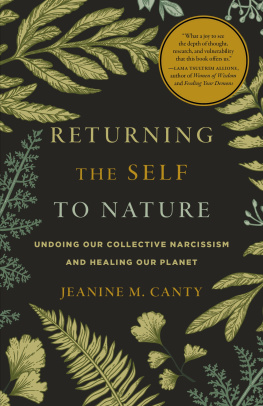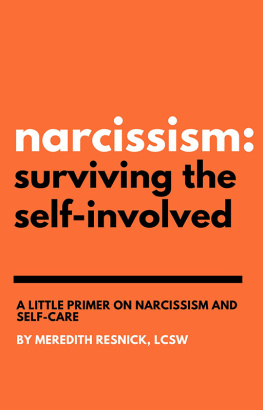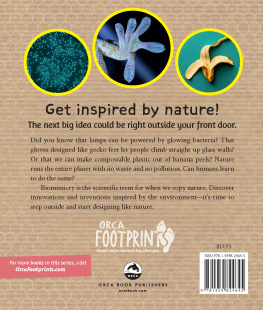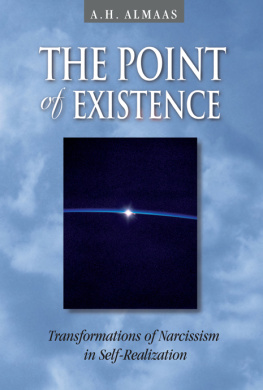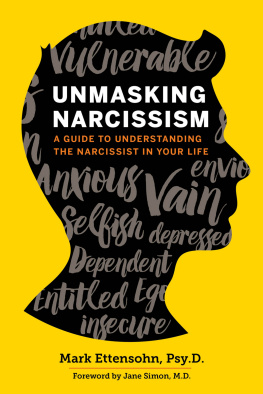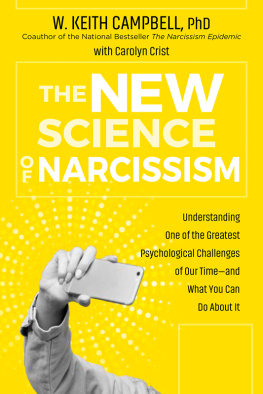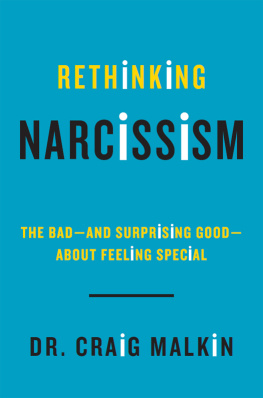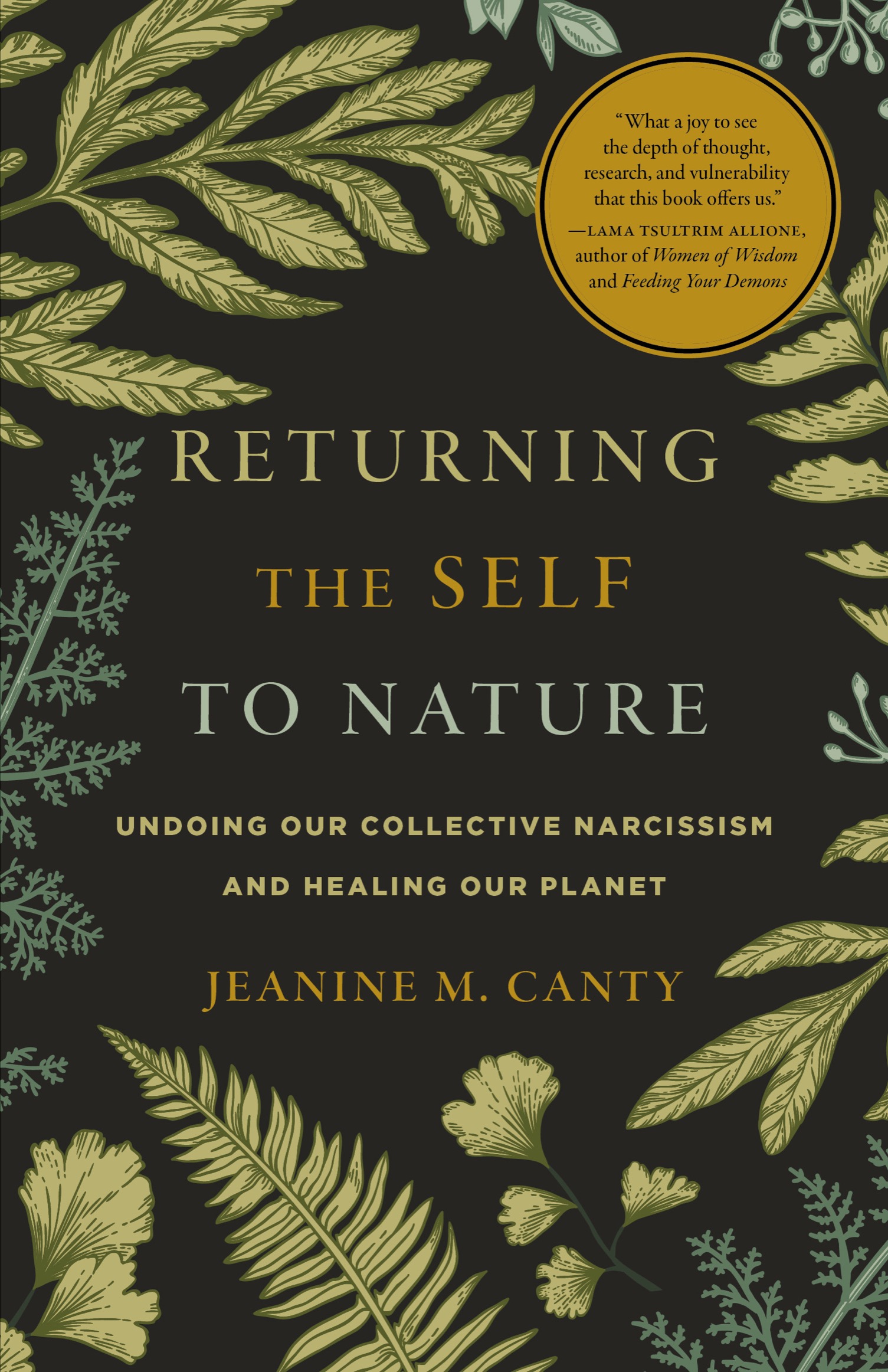Contents
Landmarks
Print Page List
Shambhala Publications, Inc.
2129 13th Street
Boulder, Colorado 80302
www.shambhala.com
2022 by Jeanine M. Canty
Cover art: Nata Slavetskaya/iStock
Cover design: Michel Vrana
Interior design: Derek George
All rights reserved. No part of this book may be reproduced in any form or by any means, electronic or mechanical, including photocopying, recording, or by any information storage and retrieval system, without permission in writing from the publisher.
Shambhala Publications makes every effort to print on acid-free, recycled paper.
Shambhala Publications is distributed worldwide by Penguin Random House, Inc., and its subsidiaries.
LIBRARY OF CONGRESS CATALOGING - IN - PUBLICATION DATA
Names: Canty, Jeanine M., author.
Title: Returning the self to nature: undoing our collective narcissism and healing our planet / Jeanine M. Canty.
Description: First edition. | Boulder, Colorado: Shambhala, [2022] | Includes bibliographical references and index.
Identifiers: LCCN 2021052148 | ISBN 9781611809749 (trade paperback)
eISBN 9780834844742
Subjects: LCSH: Human ecology. | Sustainable development.
Classification: LCC GF21 .C35 2022 | DDC 304.2dc23/eng/20211223
LC record available at https://lccn.loc.gov/2021052148
a_prh_6.0_141658919_c0_r0
PREFACE
Within this moment, I am writing in a rainstorma wall of water, complete with thunder and unseen lightning. This moment culminates the writing of this book, a multiyear inquiry of both passion and concern. I adore the words of the author Tyson Yunkaporta:
What I will say will still be subjective and fragmentary, of course, and five minutes after it is written it will already be out-of-datea problem common to all printed texts. The real knowledge will keep moving in lands and peoples, and Ill move on with it. Youll move on too.
When taking my courses, often my students will comment on the publication dates of some of our texts, stretching back decades, yet the content is so relevant to this moment. Unfortunately, our ecological crises are not going out of date, yet I am envisioning a time when they willa time when we have moved into deep healing and change, when we have collectively moved on to lifestyles that repattern back into relationship with the land and all sentient beings.
In the weeks leading up to this moment, the heat and drought too-often present in the western United States caught up to the community I live in, in the foothills of Boulder, Colorado, marked by high dry grasses, stifling heat, and pending fears of wildfires. I have lived out West for almost three decades and have become accustomed to the dryness of midsummer and the eventual coming of the rains. Yet for several summers this pattern has broken, with the rains sometimes forsaking us and the late summer and fall bringing treacherous fires. Perhaps most discouraging, the beautiful mountain air has been replaced with daily ozone warnings to stay indoors. The current pairings of fires, floods, pandemics, climate refugees, homelessness, poverty, fossil fuel pollution, and unbridled inequities often make us feel that Earth has finally forsaken usshe has decided to finally leave the abusive relationship she has been in with us for decades, or even centuries.
This book examines our growing collective narcissism and the damage we have been doing to Earth, which includes ourselves and fellow humans. The seeds for this inquiry were planted from a difficult romantic relationship I had with a narcissist. Many wise teachers see our difficulties as entry points for new learning and eventual healing. Looking at individual narcissism, I noticed how it mirrored the collective narcissism we are engaging in and the damage it is inflicting on the Earth. Over time I came to the insight that by limiting narcissism to a personal problem, we are not looking at our larger and quite ominous issues.
Tragic optimism is a term coined by the Holocaust survivor and existential-humanistic psychologist Viktor Frankl, and it embodies our ability to look for meaning during times of immense collective suffering. It is not wishing for something better to manifest without our effort; rather, it is our ability to stay with the suffering in order to learn its lesson. Waking up to the sobering realities of our ecological crisis and the ways in which our individual and collective narcissism have bred this allows us to embark on a search for not only meaning but healing.
This book is dedicated to Earth and all her beloveds, each and every sentient being. May we remember that we are family, unraveling our dysfunctions, and renewing our bonds.
NOTES
PREFACE
Tyson Yunkaporta, Sand Talk: How Indigenous Thinking Can Save the World (New York: HarperOne, 2020), 17.
Scott Barry Kaufman, The Opposite of Toxic Positivity, The Atlantic, August 18, 2021, https://www.theatlantic.com/family/archive/2021/08/tragic-optimism-opposite-toxic-positivity/619786/.
CHAPTER 1: A NEW UNDERSTANDING OF NARCISSISM
Jean M. Twenge and W. Keith Campbell, The Narcissism Epidemic: Living in the Age of Entitlement (New York: Harper Perennial, 2009).
Craig Malkin, Rethinking Narcissism: The Secret to Recognizing and Coping with Narcissists (New York: Harper Perennial, 2015), 1012.
JH Simon, How to Kill a Narcissist: Debunking the Myth of Narcissism and Recovering from Narcissistic Abuse (self-pub., 2016), 66.
Twenge and Campbell, Narcissism Epidemic, 56.
Allen D. Kanner and Mary E. Gomes, The All-Consuming Self, in Ecopsychology: Restoring the Earth, Healing the Mind, ed. Theodore Roszak, Mary E. Gomes, and Allen D. Kanner (San Francisco: Sierra Books), 79.
CHAPTER 2: FRAMING NARCISSISM
Susan M. Koger and Deborah Du Nann Winter, The Psychology of Environmental Problems: Psychology for Sustainability (New York: Psychology Press, 2010), 4145.
Koger and Winter, Psychology of Environmental Problems, 45.
Donald W. Winnicott, Ego Distortion in Terms of True and False Self, in The Maturational Processes and the Facilitating Environment: Studies in the Theory of Emotional Development, ed. Donald W. Winnicott (London: Karnac Books, 1960), 14052.
Nancy Furlotti, Narcissism in the Home, in A Clear and Present Danger: Narcissism in the Era of Donald Trump, ed. Leonard Cruz and Steve Buser (Asheville, NC: Chiron Publications, 2016), 15152.
Joe Willie Namath, I Cant Wait Until Tomorrow Cause I Get Better Looking Every Day (New York: Random House, 1969).
JH Simon, How to Kill a Narcissist: Debunking the Myth of Narcissism and Recovering from Narcissistic Abuse (self-pub., 2016), 43.
Ramani S. Durvasula, Dont You Know Who I Am?: How to Stay Sane in an Era of Narcissism, Entitlement, and Incivility (New York: Post Hill Press, 2019), 103.
Durvasula, Dont You Know Who I Am? 104.
The Mean World Syndrome: Media Violence & the Cultivation of Fear, written and directed by Jeremy Earp (Northampton, MA: Media Education Foundation, 2010), film transcript, https://www.mediaed.org/transcripts/Mean-World-Syndrome-Transcript.pdf.
Christopher Lasch, The Culture of Narcissism: American Life in an Age of Diminishing Expectations (New York: W. W. Norton, 1979), 13.

